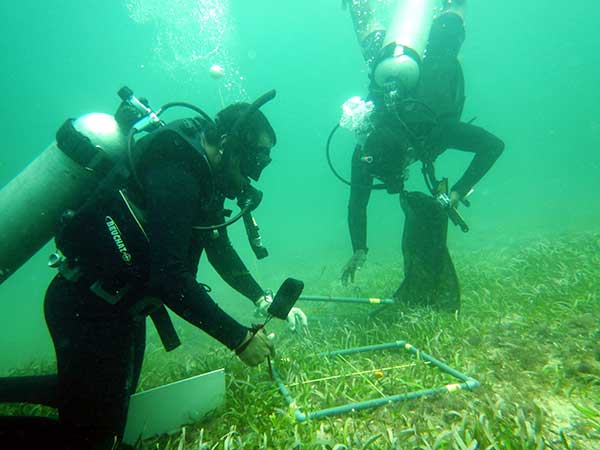Death at the bottom of the bay
By Zhao Xu ( China Daily ) Updated: 2017-04-22 07:09:52
 |
|
Divers from Sri Lanka's Wildlife Conservation Department measure sea grass. Ocean Research & Conservation Association. |
"With all the mapping we have done and will do - scuba divers are sent to measure the extent and density of the meadows - we are trying to set up a database which would then inform our protection efforts."
One crucial factor behind the dramatic decrease of dugongs is the destruction of sea grass meadows, often by bottom trawling. Another factor is dynamiting, an illegal method of fishing. Typically, with dugongs killed by dynamiting blood spurts from their nose, in the kind of scene that so shocked Channa Suraweera.
"Bottom trawling is a fishing method whereby the fishnet is towed along the sea floor, damaging everything along the way," says Laksman Peiris, deputy director of Wildlife Conservation Department. "Ninety percent of dugong killed is killed by this net.
"Though not encouraged, bottom trawling is legal in Sri Lanka. The fishermen may not be aiming for the dugong, but a dugong caught accidentally by the fishnet has a slim chance of survival. That's because dugong, being a mammal, has to come to the surface of the water every six or seven minutes to breathe. Being caught by a net that lies at the bottom of the ocean, a dugong has no choice but to die a terrible death."
Suraweera, who once examined the body of a dugong killed by bottom trawling, has an acute sense of what a terrible death means. "Its lungs are filled with water. Can you imagine water seeping gradually into its lungs while the animal struggles desperately but in vain?
"A fisherman, after throwing his net into the ocean, only comes back every half or one hour to examine his catch," says Prasanna Weerakkody, of the Oceans Research & Conservation Association, a Canadian NGO with a Sri Lankan presence which is also part of the dugong project.
"By that time the dugong may have already died. Even if it's not dead it's almost impossible for the fisherman to release the dugong since that means cutting off the entire net and losing all the catch."
Asked why the government has not required the fishermen to release the dugong and then be compensated for their loss, Suraweera says this is because the dugong, once released, will swim away. "You have to prove that you have indeed caught a dugong."
|
|
|
|
|
|
|
|

























 Raymond Zhou:
Raymond Zhou: Pauline D Loh:
Pauline D Loh: Hot Pot
Hot Pot Eco China
Eco China China Dream
China Dream China Face
China Face






